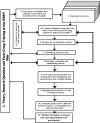Knowledge, attitudes and practices related to stroke in Ghana and Nigeria: A SIREN call to action
- PMID: 30444884
- PMCID: PMC6239297
- DOI: 10.1371/journal.pone.0206548
Knowledge, attitudes and practices related to stroke in Ghana and Nigeria: A SIREN call to action
Abstract
Introduction: Stroke is a prominent cause of death, disability, and dementia in sub-Saharan Africa (SSA). The Stroke Investigative Research and Education Network works collaboratively with stroke survivors and individuals serving as community controls to comprehensively characterize the genomic, sociocultural, economic and behavioral risk factors for stroke in SSA.
Purpose: In this paper, we aim to: i) explore the attitudes, beliefs, and practices related to stroke in Ghana and Nigeria using the process of qualitative description; and ii) propose actions for future research and community-based participation and education.
Methods: Stroke survivors, their caregivers, health care professionals, and community representatives and faith-based leaders participated in one of twenty-six focus groups, which qualitatively explored community beliefs, attitudes and practices related to stroke in Ghana and Nigeria. Arthur Kleinman's Explanatory Model of Illness and the Social Ecological Model guided the questions and/or thematic analysis of the qualitative data. We hereby describe our focus group methods and analyses of qualitative data, as well as the findings and suggestions for improving stroke outcomes.
Results and discussion: The major findings illustrate the fears, causes, chief problems, treatment, and recommendations related to stroke through the views of the participants, as well as recommendations for working effectively with the SIREN communities. Findings are compared to SIREN quantitative data and other qualitative studies in Africa. As far as we are aware, this is the first paper to qualitatively explore and contrast community beliefs, attitudes, and practices among stroke survivors and their caregivers, community and faith-based leaders, and health professionals in multiple communities within Nigeria and Ghana.
Conflict of interest statement
The authors have declared that no competing interests exist.
Figures
References
-
- Feigin VL, Krishnamurthi RV, Parmar P, Norrving B, Mensah GA, Bennett DA, et al. Update on the global burden of ischemic and hemorrhagic stroke in 1990–2013: The GBD 2013 study. Neuroepidemiology. 2015;45(3):161–76. 10.1159/000441085 - DOI - PMC - PubMed
-
- Owolabi MO, Akarolo-Anthony S, Akinyemi R, Arnett D, Gebregziabher M, Jenkins C, et al. The burden of stroke in Africa: a glance at the present and a glimpse into the future: review article. Cardiovascular J Africa. 2015;26(2):S27–S38. 10.5830/cvja-2015-038 - DOI - PMC - PubMed
-
- Taming the burgeoning stroke epidemic in Africa: stroke quadrangle to the rescue (P01.002). Neurology. 2012;78(Meeting Abstracts 1):P01.002-P01. 10.1186/1471-2377-12-78 - DOI - PubMed
-
- Ovbiagele B. National sex-specific trends in hospital-based stroke rates. J Stroke and Cerebrovascular Dis. 2011;20(6):537–40. 10.1016/j.jstrokecerebrovasdis.2010.03.007 - DOI - PubMed
-
- Arisegi SA, Awosan KJ, Oche MO, Sabir AA, Ibrahim MT. Knowledge and practices related to stroke prevention among hypertensive and diabetic patients attending specialist hospital, Sokoto, Nigeria. Pan African Med J. 2018;29 doi: 10.11604/pamj.2018.29.63.13252 - DOI - PMC - PubMed
Publication types
MeSH terms
Grants and funding
LinkOut - more resources
Full Text Sources
Medical
Research Materials
Miscellaneous



